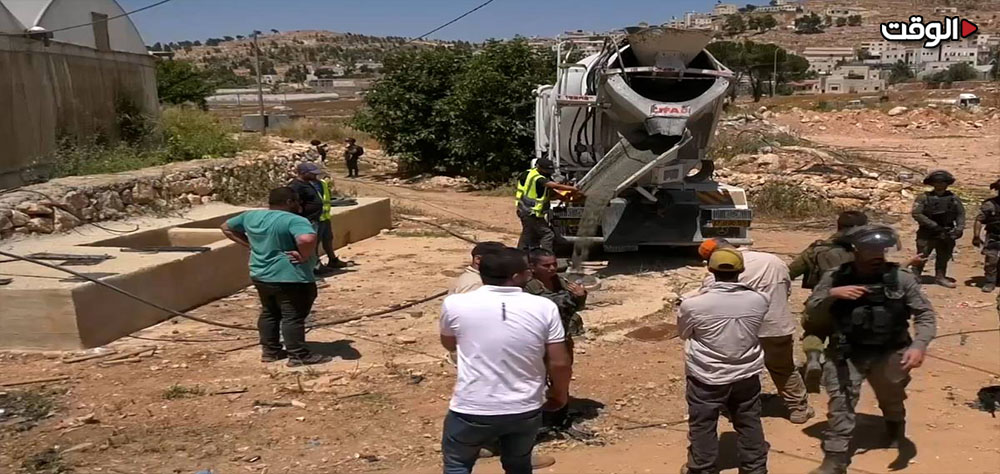Alwaght- The Israeli regime has not only caused a humanitarian crisis in Gaza, but also now by plundering the water resources in the West Bank is seeking to wage a water war against the Palestinians.
While the water shortage has become a severe crisis for the West Bank Palestinians, analysts suggest that the Israeli weaponization of the water for collective punishment is the factor behind this crisis, a weapon the Israelis are using to control the population of Palestinians in the West Bank and to help push forward with the settlement projects.
The occupied territories, especially the West Bank and the Golan Heights, are important for Israel's water, economy, and security. About one-third of Israel's water resources originate from rainfall in the western slopes of the West Bank and are extracted from the same aquifer system that supplies the West Bank. Therefore, the occupation of the West Bank by Israel since 1967 has enabled the further exploitation of this aquifer by preventing the development of new water sources by the Arab population. At the same time, the Israeli settlements on the West Bank of the Jordan River also use the aquifer.
Every summer, the water crisis in the West Bank reoccurs, and water tankers start operating to meet the needs of households, charging twice the usual price.
This year's crisis also began in early summer, when the Israeli national water company Mekorot, which provides part of the Palestinian Authority water needs, cut its supplies between 40 and 50 percent. According to residents of the West Bank, despite the abundance of underground water, the occupation forces blow up or close down water well projects.
The technical adviser to the head of the West Bank Water Department, Moad Abu Saada, told Al Jazeera that Palestinians in the West Bank depend on two sources of water: the local source, which is the underground wells concentrated in the area and provides 42 percent water of north of the West Bank and Jericho region. And another source of water purchased from Merokot is especially for the central and southern West Bank provinces, which constitutes 58 percent of the total water.
This Palestinian official adds that this problem is repeated every summer as a result of the amount of water provided by Israel not changing and even decreasing" despite the increase in the population of the region. Abu Saada says that the Israeli company pumped 25,000 liters instead of 33,000 liters per day in late June, which marked the largest decrease in Ramallah's water share. Since 2018, the supply of water in the West Bank has gradually decreased instead of increasing. For example, in Hebron, the largest city in the West Bank, the advisor to the Water Department says that the Israeli side has reduced the amount of water from 34,000 liters per day to 22,000 liters at one point, and the problem is that this situation continues and is getting worse.
Israel blocking well digging by Palestinians
One of the reasons behind water crisis intensification in the West Bank is the crackdown by Israel against well digging in the Palestinian-majority villages.
Abu Saada said that according to the Oslo Accords, the Israeli side should authorize water well after license is approved. But according to this Palestinian official, this work is almost impossible. He added that Gaza war has increased this crackdown.
Also, Suleiman Malasa, the head of Al-Quds (Jerusalem) Water Department Staff Syndicate told Aljazeera about the recurrent attacks by the settlers and sabotage measures against the fresh water wells in the Palestinian villages.
Melasa says that the number of water subscribers in Ramallah, which is considered as a sub-category of the Al-Quds Water Department, in the last 6 years has increased from about 68,000 to 84,000 people, but still the share of this region remains unchanged at about 35,000 liters and sometimes even decreases to 25,000 liters.
This Palestinian official noted that they resort to emergency solutions like providing water with tankers to some specific regions. But the price difference is about 4 shekels (a little more than a dollar) per liter directly from the Water authority. The price of one liter may reach 40 shekels, which is about $11. The data of the Palestinian Central Bureau of Statistics shows that the average per capita consumption of water by Palestinians is about 85.7 liters per day, while this amount is much higher for Israelis and reaches more than 7 times the per capita consumption of Palestinians.
A report published by the Applied Research Institute of Jerusalem (ARIJ) on July 4 indicated that 86 military orders had been issued from 2019 to last June. This report holds that military orders are the most important leverage of Israel's pressure against the development of the Palestinian water sector. According to this institute, the water issue is a serious crisis in the Occupied Palestinian Territories, but over the past two decades, "it has taken a different and dangerous path and reached unprecedented levels."
The report adds that military orders have imposed severe restrictions on the Palestinians for development of their water sector and represented a real obstacle to their capability to manage their necessary water. The report explained that according to Israeli law, all military orders are within the framework of previous orders, including Decree No. 92 issued on August 15, 1967, which "entrust the control of all water affairs to military officers in charge of this sector."
Also, this report refers to two military decrees issued in 1967 and 1968 according to which all wells, springs and water projects are under the direct supervision of the military rule of Israel and all water resources in the Palestinian territories have become the property of this regime.
Given these conditions, Palestinians think that Israeli stepping up of water war against the West Bank amid Gaza war is part of Tel Aviv's punitive policy targeting Palestinians of the West Bank for their support for anti-Israeli resistance.



























